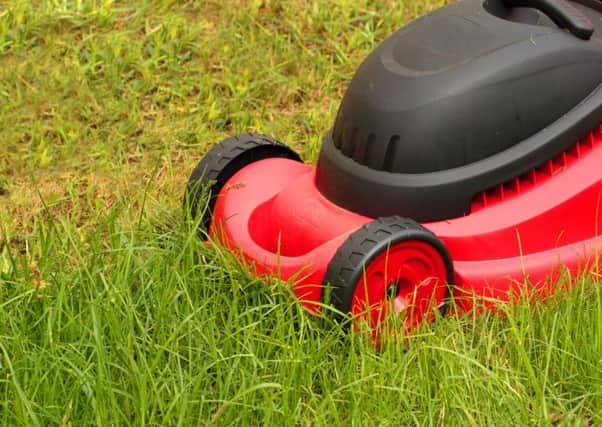The lowdown on lawnmowers


Lawnmower prices range from under £100 to thousands for elaborate sit-on types, but expect to pay at least a few hundred if you have a fair sized lawn and want something that will last.
Petrol, corded electric or battery are the main options and each has its own pros and cons.
Advertisement
Hide AdAdvertisement
Hide AdIn our environmentally-conscious world, battery-powered options - once dismissed by lawn lovers because of the batteries’ dubious staying power and need to replace them after a winter in storage - have become more sophisticated as Lithium-Ion batteries don’t lose power like the old ones.
In the last 12 months, sales of cordless electric lawn mowers at Homebase have increased by more than 700% compared with the previous year.
Bosch stopped manufacturing petrol mowers in 2010 to go eco-friendly and has long been extolling the virtues of Lithium-ion batteries which, it claims, perform as petrol equivalents but with low noise, low vibrations and savings on running costs.
Battery-operated mowers are generally lighter machines, don’t pump out carbon monoxide and are much quieter than their petrol counterparts. You don’t have to worry about a cable or expend energy pulling a cord to start them either, as they start at the touch of a button.
Advertisement
Hide AdAdvertisement
Hide AdOther than following battery care instructions and annually sharpening the blades, cordless mowers need no other kind of maintenance.
BATTERY POWER
Indeed, the Bosch Rotak 43 LI Ergoflex cordless lawnmower (£469.99, shop.bosch-do-it.com) can give an excellent cut for a good 40 minutes on one charge, although reviewers have found that the rear roller doesn’t noticeably stripe the lawn. It has a charge time of 140 minutes.
The new EGO Power+ lawnmower (£499, www.egopowerplus.co.uk) whispers in at 83 decibels, quieter than a food blender. On an average lawn on flat ground, the battery would last around 45 minutes and can recharge in 30.
The disadvantages of battery mowers are that you have to remember to recharge the batteries and they won’t stripe your lawn as effectively as a heavier machine.
PETROL POWER
Advertisement
Hide AdAdvertisement
Hide AdPetrol-driven motors may be better for bigger lawns and where you need plenty of power on slopes or uneven surfaces. There are push and self-propelled varieties, having throttle control which eases the pushing ability of the user.
Petrol mowers give a good striped effect as they are heavier and, although they need servicing, it could be argued that a well-maintained, good quality petrol mower will outlast most electric ones. The Mountfield SP454 self-propelled petrol lawnmower (£304, B&Q, www.diy.com) is a great option for lawns up to 1500m squared.
Users also won’t encounter the cumbersome cables of electric models and the need for safety cut-out plugs.
ELECTRIC POWER
A corded electric mower is fine for a smaller suburban garden, if you’re not bothered about keeping the cable out of the way of the blades.
Advertisement
Hide AdAdvertisement
Hide AdElectric ‘hover’ mowers are the cheapest, but can produce a disappointing finish, often require a spanner to adjust the mowing height and don’t always collect grass efficiently.
Ultimately, your choice should depend on your lawn type and size. If you have a small or medium-sized lawn, a battery-operated mower or light electric type should be fine for your needs. For example, the Bosch 32R Corded Lawnmower (£78.92, Homebase, www.homebase.co.uk) is lightweight and perfect for smaller lawns.
CYLINDER OR ROTARY?
So, cylinder or rotary? Cylinder mowers are for the lawn perfectionist who wants a finer cut and bowling green finish. They are ideal for flat lawns and short grass, but struggle with long or wet grass. If you want the exercise, opt for a push variety. If you don’t, self-propelled is the way to go.
Rotary mowers are better all-rounders, cut better in wet or long grass and cope well with uneven, bumpy surfaces. Their blades can be easily changed to boot. Try the Mac Allister 1300W Rotary Lawnmower (£84, B&Q, www.diy.com) - a great all-rounder for gardens of a good size.
NEW ALTERNATIVES
Advertisement
Hide AdAdvertisement
Hide AdLazy gardeners might prefer to sink a gin and tonic on the patio while watching the lawn being mown by a robotic device such as Robomow, which starts at an eye-popping £1,199 for the RC304, increasing to £2,799 for the upgraded RS635 model, available from selected dealers nationwide (robomow.com).
But real gardeners may relish the exercise that goes with a mower they can push, and the pleasure of seeing the well-groomed green carpet they’ve created at the end of their workout.